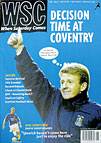 Scotland's trailblazing fanzine The Absolute Game is making a comeback. But, wonders Tom Davies, has the printed word had its day as a tool for fans?
Scotland's trailblazing fanzine The Absolute Game is making a comeback. But, wonders Tom Davies, has the printed word had its day as a tool for fans?
The welcome return of The Absolute Game seems bound to induce bouts of premature nostalgia in fans of a certain age and attitude; a throwback to the days of co-ordinated campaigns against ID cards and dodgy policing, to when the floor of Sportspages bookshop in London would be covered in inky outpourings of anger and calls to arms; to the days when jokes about haircuts and bad away kits really did seem like the cutting edge of radical humour.
Many of the ideas of the early mags had, of course, been appropriated by the mainstream by the mid-Nineties. Jokes about fat players with beards and Seventies retro-chic could safely be accommodated within the largely conservative formats of the new wave of glossies and the expanded newspaper sports supplements. Much of the political stuff couldn’t though – so the tirades against the introduction of the Premiership, the Champions League, all-seater stadiums and the like were dismissed and marginalised, while the idea of “a platform for the fans” became denigrated as programmes such as 6.06 were plunged into a sea of hellish banality by the likes of David Mellor.
The football audience, too, is different, something which gives Manchester United fanzine United We Stand cause to fret in its 100th issue: “The ‘consumer’ has changed, and with it the match habits of many a hardcore fan who justifies the existence of fanzines, and who through the available medium expressed all the hopes and wishes he had for his beloved club.” Although the Man Utd experience of New Football is an exaggerated and untypical one, these fears do have some resonance.
More importantly, though, other forms of expression have come to the fore. Internet sites in particular offer immense potential for fanzine-esque ranting, and are spiced by an immediacy and a degree of interactivity that a magazine cannot match. If you have just watched your team lose 3-0 at home to the bottom club, why write 1,000 angry words in a fanzine article that no one will be able to read for maybe a month, when with a computer you can log on, spout off and reach out to your fellow sufferers as soon as you get home?
Internet message boards offer almost limitless potential for debate and communication. The initial Fans United day at Brighton in 1997, for example, was conceived and nurtured in just such a way, while topics can be explored and discussed in far greater detail than they can within the constraints of a 32-page magazine. The best sites create their own sense of community, and if at times they can get quite alarmingly personal, there is a democracy and accessibility that allows unorthodox opinion to breathe.
But the medium is skewed towards the young and affluent, who are far more likely to have net access than, say, the old codger who has been standing in front of you for the past 20 years. As with all new technologies, we should be wary of the hype. The internet has not, and will not, lead to the death of the printed word, not least because, in football’s case, your average website is not exactly a riot of wit, intelligence and irreverence.
Whereas there has always been something of an unspoken protocol among many fanzine editors not to slag off rival publications (partly as a statement of principle, partly in mutual appreciation of the amount of work that goes into producing a magazine), the message board format does lend itself easily to abusive exchanges along the lines of “you’re shit”, “no, you’re shit”. It’s a transient, disposable format tailor-made for bores, boors and exhibitionists and you rarely get the sense that anything you say is having much of an impact. There are so many sites around after all, so who, really, is taking any notice? In cyberspace, no one can hear you scream.
Putting yourself in the firing line by standing outside a football ground peddling scurrilous ideas in a fanzine is a different matter altogether. Fanzines are still more likely to put the wind up chairmen, their editors still more likely to be contacted for comment by established media when a big story breaks about their club. More importantly, their format lends itself much more to considered, intelligent writing. Think of, say, five good articles you have read – and then try to recall five good internet postings. We need fanzines as much as we ever have – and thankfully, they will probably always be here. Although the days are long gone when obsessives would stroll into Sportspages and buy every single fanzine, the shop reports that sales have held up surprisingly well.
The vast majority of websites, too, are not underpinned by the same spirit of rebellion and solidarity which nourished the fans movement in the late Eighties, leaving netsurfers buried by a surfeit of partisan rantings about referees and rival supporters. A good time, then, to let the photocopiers roll again and welcome back TAG. Although when fanzine writers start getting nostalgic about their own output, then maybe the game really is up. Anyone seen any decent own goals by tubby, bearded, ginger left-backs in ill-fitting shorts lately?
From WSC 172 June 2001. What was happening this month